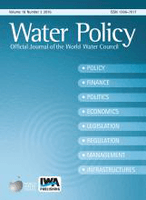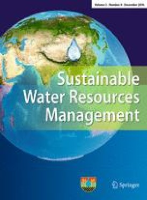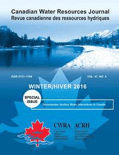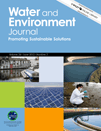
Water Policy
Scope & Guideline
Innovating water management through research and dialogue.
Introduction
Aims and Scopes
- Water Governance and Policy:
Explores the frameworks and institutional arrangements that govern water resources, including legal, regulatory, and participatory approaches. - Sustainable Water Management:
Focuses on strategies for managing water resources sustainably, including integrated water resources management (IWRM) and the water-energy-food nexus. - Impact of Climate Change:
Investigates the effects of climate change on water availability, quality, and governance, emphasizing adaptive strategies and resilience building. - Water Quality and Public Health:
Addresses issues related to water quality, sanitation, and public health, including the impacts of water pollution and access to safe drinking water. - Socioeconomic Dimensions of Water Use:
Analyzes how socioeconomic factors influence water access, usage patterns, and the effectiveness of water policies. - Technological Innovations in Water Management:
Examines the role of technology in improving water management practices, including smart water systems, wastewater treatment, and water recycling.
Trending and Emerging
- Integrated Water Resources Management (IWRM):
There is a rising focus on IWRM as a comprehensive approach that considers the interconnections between water, land, and related resources, promoting sustainability and stakeholder engagement. - Climate Resilience and Adaptation Strategies:
Emerging research is increasingly addressing the need for adaptive strategies in water management to confront the challenges posed by climate change. - Public Participation in Water Governance:
Studies emphasizing the importance of involving communities and stakeholders in water governance are gaining traction, reflecting a shift towards more participatory models. - Technological Innovations and Digital Water Management:
The integration of technology, such as AI and IoT, in water management practices is trending, with a focus on improving efficiency and data-driven decision-making. - Water-Energy-Food Nexus:
Research examining the interdependencies between water, energy, and food systems is on the rise, highlighting the need for coordinated policies that address these critical resources. - Social Equity in Water Access:
There is a growing emphasis on addressing social inequities related to water access and management, reflecting broader societal concerns about justice and inclusion in water governance.
Declining or Waning
- Traditional Water Supply Infrastructure:
Research focusing solely on traditional infrastructure approaches to water supply has declined, with a shift towards integrated and sustainable solutions. - Purely Economic Analyses of Water Pricing:
Studies that examine water pricing in isolation from broader social and environmental contexts have become less frequent, as the journal increasingly emphasizes holistic approaches. - Historical Water Policies:
There is a noticeable decrease in papers focused strictly on historical analyses of water policies, as contemporary issues and future-oriented studies gain more attention. - Regional Case Studies Without Broader Implications:
While regional studies remain important, those that do not connect to larger theoretical frameworks or global trends are becoming less common. - Water Conflict Resolution Mechanisms:
Themes centered on conflict resolution in water disputes without considering collaborative governance or transboundary management are waning.
Similar Journals

Sustainable Water Resources Management
Connecting policymakers and researchers for a sustainable tomorrow.Sustainable Water Resources Management is an esteemed journal focusing on the critical field of water resource management in the context of sustainability. Published by Springer International Publishing AG, this journal serves as a vital platform for researchers, policymakers, and practitioners to disseminate cutting-edge research and innovative practices aimed at addressing global water challenges. With an impressive impact factor aligned with its Q2 ranking in Water Science and Technology and Q3 in Renewable Energy, Sustainability, and the Environment, it maintains a robust reputation in its field, evidenced by its Scopus rankings. Covering a diverse range of topics from integrated water resource management to the nexus between water and energy, Sustainable Water Resources Management is committed to fostering knowledge exchange and encouraging interdisciplinary dialogue among its audience. This journal, operating under strict academic rigor, plays an essential role in advancing sustainable practices and is open from 2015 to 2024, making it a relevant resource in today’s rapidly evolving environmental context.

Hydrology
Leading the way in hydrological research and innovation.Hydrology, published by MDPI, is a prominent open-access journal dedicated to advancing the field of hydrological science. Since its establishment in 2014, the journal has garnered a reputation for excellence, reflected in its classification within the Q2 quartile for 2023 across multiple categories including Earth-Surface Processes, Oceanography, Water Science and Technology, and Waste Management and Disposal. Based in Switzerland, Hydrology provides a vital platform for scholars and practitioners to disseminate research findings, promote innovative methodologies, and foster discussions on current trends affecting water resources and management globally. The journal is easily accessible online and aims to significantly contribute to the understanding of hydrological processes, offering insights that are pivotal for addressing contemporary environmental challenges. With Scopus rankings showcasing its growing influence, Hydrology is a crucial resource for researchers, students, and professionals committed to water science and sustainable practices.

Water Resources
Pioneering interdisciplinary research for water resilience.Water Resources, a prominent journal published by MAIK NAUKA/INTERPERIODICA/SPRINGER, focuses on the critical and evolving field of water science and technology. Established in 1976 and with a long-standing commitment to advancing knowledge, this journal explores interdisciplinary research that addresses the challenges surrounding water resource management, quality, and sustainability. With an impact factor positioned within the Q3 category of its field, it holds a notable Scopus rank (#181/261) in Environmental Science, emphasizing its role in driving scholarly discourse. While currently not open access, Water Resources provides vital insights for researchers, professionals, and students, making it an essential resource for those seeking to innovate and implement effective water management solutions. To stay ahead in a domain that is increasingly paramount to global sustainability efforts, consider engaging with the latest research published in this vital journal.

RBRH-Revista Brasileira de Recursos Hidricos
Navigating the Future of Water Resource ManagementRBRH-Revista Brasileira de Recursos Hidricos is a leading peer-reviewed journal dedicated to the dissemination of high-quality research in the field of water resources, published by the Associação Brasileira de Recursos Hídricos (ABRH). With both ISSN 1414-381X and E-ISSN 2318-0331, this journal has established itself as an essential resource since its transition to Open Access in 1996, fostering widespread accessibility to vital research findings. Based in Brazil, the journal serves a global audience, embodying a commitment to the study and management of aquatic systems, including their dynamics and technological solutions. As part of its rigorous academic contributions, it has achieved Q3 rankings across categories such as Aquatic Science, Earth-Surface Processes, Oceanography, and Water Science & Technology, reflecting its impact and relevance in these domains. Researchers, professionals, and students are encouraged to engage with the journal's diverse array of studies from 2016 to 2024, consolidating knowledge on crucial water resource challenges and innovations.

H2Open Journal
Championing open research for a thriving aquatic ecosystem.H2Open Journal, published by IWA Publishing, is a leading open-access platform established in 2018, dedicated to advancing the field of water science and technology. With its E-ISSN 2616-6518, this journal caters to a global audience, providing essential research insights that span various domains, including environmental science, management, monitoring, policy, law, and water science. The journal has achieved notable recognition in recent years, holding a Q3 ranking in three distinct categories within the 2023 environmental science metrics. Its commitment to open access ensures that valuable research is freely available to researchers, professionals, and students alike, fostering collaboration and innovation in water-related disciplines. With a focused publication strategy spanning from 2018 to 2024, H2Open Journal is poised to be a pivotal resource for addressing critical challenges in water sustainability and management, reflecting the pressing need for informed actions in the face of global water issues.

Canadian Water Resources Journal
Unveiling critical insights in hydrology and policy.Canadian Water Resources Journal, published by Taylor & Francis Inc, is a leading academic journal dedicated to the field of water science and technology. With a significant history dating back to its inception in 1976, the journal offers a platform for high-quality, peer-reviewed research that addresses critical issues in water resources management, hydrology, water quality, and policy. The journal is recognized for its valuable contributions to the field, exemplified by its classification in the Q2 category for Water Science and Technology and holding a respectable rank of #137 out of 261 in the Scopus Environmental Science category. While it does not currently offer open access, its articles remain accessible through various institutional subscriptions, ensuring that professionals, researchers, and students stay updated with the latest advancements and discussions in water resources. As it converges towards its ongoing publication commitment through 2024, the Canadian Water Resources Journal remains an essential resource for those engaged in the pursuit of sustainable water management solutions.

Journal of Applied Water Engineering and Research
Fostering Impactful Research for a Sustainable Water FutureJournal of Applied Water Engineering and Research is a dynamic platform dedicated to the advancement of knowledge in the field of water science and technology. Published by Taylor & Francis Ltd, this journal aims to bridge the gap between theoretical research and practical applications in water engineering, providing a crucial resource for researchers, practitioners, and policymakers. With an ISSN of 2324-9676 and an impressive ranking in the Q3 category for Water Science and Technology, it occupies a distinctive position within the scholarly community. The journal covers a wide spectrum of topics, including innovative water management strategies, sustainable practices, and the integration of technology in water resource management, thus contributing significantly to the discourse surrounding environmental sustainability. With publication years converging from 2013 to 2024, the Journal of Applied Water Engineering and Research continues to foster impactful research, enhancing our understanding and management of vital water resources.

WATER AND ENVIRONMENT JOURNAL
Exploring solutions for water and environmental challenges.WATER AND ENVIRONMENT JOURNAL is a prominent interdisciplinary journal dedicated to the latest research and advancements in the fields of water resources, environmental engineering, and pollution management. Published by WILEY, the journal has established itself as an essential resource for academics, practitioners, and policymakers since its inception in 1987. With an impressive impact factor reflecting its robust influence, it ranks in the Q2 and Q3 quartiles across multiple categories, including Water Science and Technology, Environmental Engineering, and Management, Monitoring, Policy and Law. The journal welcomes high-quality research articles, reviews, and case studies that address the critical challenges facing water and environmental sciences. As an open access publication, it provides a platform for widespread accessibility and engagement, ensuring that the knowledge generated is disseminated to a diverse audience. With a commitment to advancing understanding and solutions in water-related issues, WATER AND ENVIRONMENT JOURNAL plays a crucial role in shaping the future of environmental research and technology.

Water Conservation Science and Engineering
Unveiling Innovations in Water Science and TechnologyWater Conservation Science and Engineering, published by SPRINGERNATURE, is a vital academic journal dedicated to advancing the fields of environmental engineering, ocean engineering, waste management, and water science and technology. Since its inception in 2016, the journal has quickly established itself within the academic community, achieving a commendable Q3 ranking across multiple categories in 2023. With an ISSN of 2366-3340 and an E-ISSN of 2364-5687, it is accessible to a global readership eager to explore the latest research and innovations in water conservation and sustainable practices. Although currently not open access, the journal is committed to publishing high-quality scholarly articles that provide insights into effective water management strategies, innovative engineering solutions, and the critical importance of preserving our water resources. Based in Singapore, Water Conservation Science and Engineering aims to foster interdisciplinary collaboration among researchers, professionals, and students, making it an essential resource for anyone passionate about environmental sustainability and preservation.

Water Practice and Technology
Exploring Innovative Solutions for Water Resource ManagementWater Practice and Technology is a distinguished open-access journal published by IWA PUBLISHING, dedicated to disseminating cutting-edge research and practical insights within the field of water science and technology. With an E-ISSN of 1751-231X, the journal has been at the forefront of sharing knowledge since its inception in 2011 and has transitioned to open access in 2021, providing unrestricted access to high-quality research articles. Based in the United Kingdom, this journal plays a vital role in advancing the understanding of water resource management, treatment technologies, and environmental sustainability. As of 2023, it is categorized in the Q3 quartile for Water Science and Technology with a Scopus rank of #157/261, placing it in the 40th percentile among its peers. Researchers, professionals, and students alike will find the journal a valuable resource for the latest trends, innovations, and practical applications in the water sector, facilitating a collaborative approach towards addressing global water challenges.